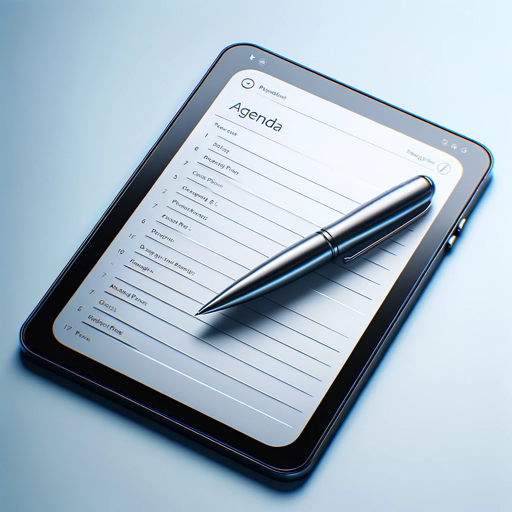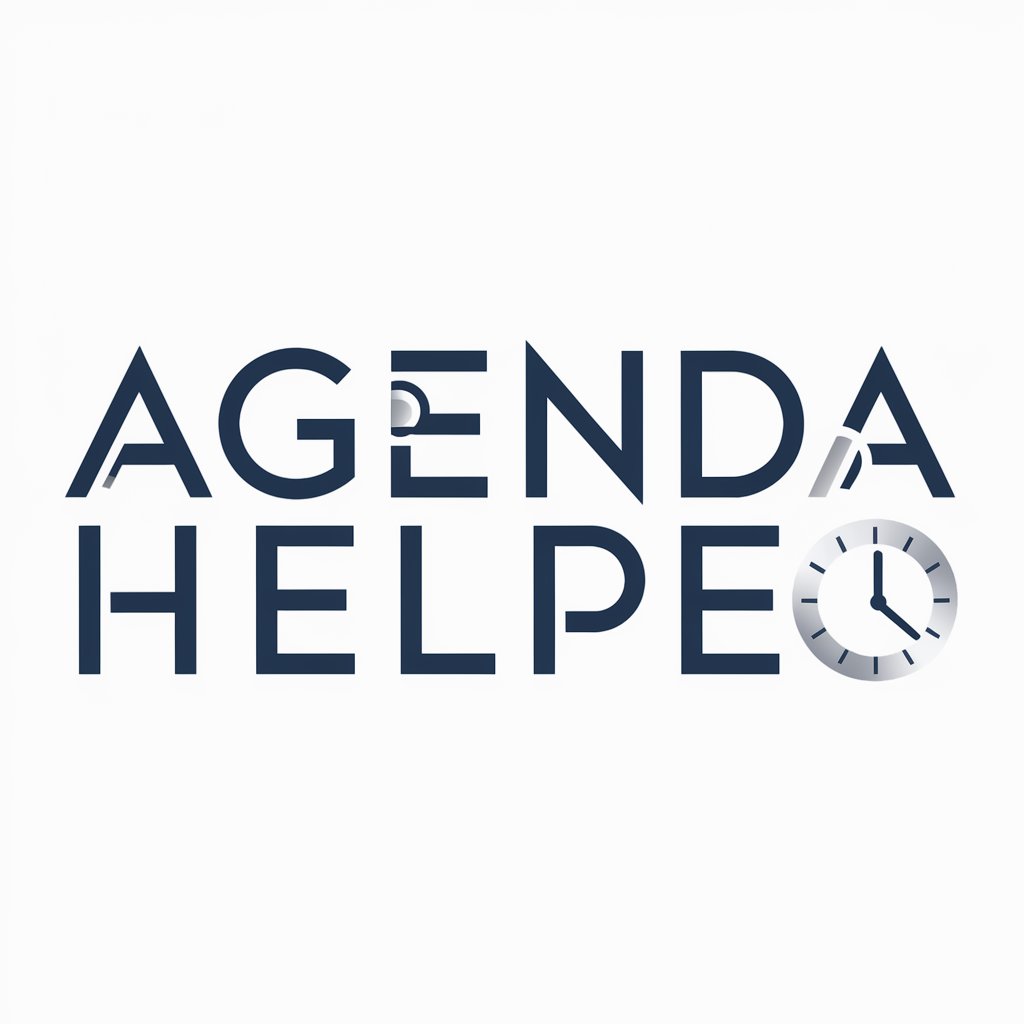Agenda Assistant - Efficient Meeting Planning

Hello! Ready to craft an effective meeting agenda?
Craft clear, efficient agendas with AI
How do I create an agenda for my team meeting?
What are some tips for an effective meeting agenda?
Can you help me prioritize topics for our next meeting?
How long should each topic in our meeting take?
Get Embed Code
Overview of Agenda Assistant
Agenda Assistant is designed to streamline the creation and management of meeting agendas, ensuring they are clear, efficient, and participatory. Its core functionality revolves around providing detailed advice on agenda content, including standard items like 'Opening Remarks,' 'Discussion Points,' and 'Action Items.' A key feature is its ability to suggest time allocations for each agenda topic, promoting a balance between thorough discussion and meeting efficiency. Agenda Assistant also emphasizes participant engagement by advising on strategies to involve meeting participants in the agenda-setting process. This includes gathering input on agenda items before the meeting and encouraging active participation during the meeting. The service is built with flexibility in mind, allowing for last-minute adjustments and accommodating extended discussions on unexpected topics. Post-meeting, it offers guidance on follow-up actions such as distributing meeting minutes and tracking the progress of assigned tasks. Powered by ChatGPT-4o。

Core Functions of Agenda Assistant
Agenda Structuring
Example
For a project kickoff meeting, Agenda Assistant might suggest starting with 'Opening Remarks' (5 minutes), followed by 'Project Overview' (15 minutes), 'Roles and Responsibilities' (10 minutes), 'Initial Questions and Concerns' (10 minutes), and concluding with 'Next Steps and Action Items' (10 minutes).
Scenario
This structure ensures a concise yet comprehensive kickoff, providing clarity on project objectives, team roles, and immediate action points.
Time Management
Example
In a quarterly review meeting, it might allocate 20 minutes for 'Performance Overview,' 15 minutes each for 'Challenges' and 'Opportunities,' followed by a 10-minute 'Q&A' session, ensuring the meeting stays within a one-hour window.
Scenario
This helps in maintaining focus on key topics while allowing time for addressing questions, keeping the meeting on schedule.
Participant Engagement
Example
For a strategy planning session, Agenda Assistant might suggest an 'Idea Generation' segment where each participant gets 5 minutes to present their ideas, followed by a group discussion.
Scenario
This approach encourages active contribution from all attendees, fostering a collaborative environment.
Flexibility and Adaptability
Example
If an unexpected but critical issue arises during a meeting, Agenda Assistant advises on how to adjust the agenda in real-time, possibly by shortening less critical topics or scheduling a follow-up meeting.
Scenario
This ensures that urgent matters receive the attention they need without derailing the entire agenda.
Follow-Up and Accountability
Example
After a decision-making meeting, it recommends drafting a summary of decisions made, assigning action items with deadlines, and scheduling a follow-up meeting to review progress.
Scenario
This ensures that decisions lead to action and that there's a mechanism for holding participants accountable for their commitments.
Target User Groups for Agenda Assistant
Project Managers
Project managers often juggle multiple meetings across various stages of project development. They can leverage Agenda Assistant to craft clear agendas that keep meetings focused and productive, ensuring that project milestones are met on schedule.
Team Leaders
Team leaders conducting regular team meetings or stand-ups can utilize Agenda Assistant to create agendas that encourage team participation, clarify objectives, and streamline the discussion of progress and blockers.
Event Organizers
For event organizers coordinating planning meetings, Agenda Assistant can help outline agendas that cover all logistical and thematic aspects of the event, ensuring comprehensive discussions and actionable outcomes.
Educators and Trainers
Educators and trainers can use Agenda Assistant to design lesson plans or training sessions, where time management and participant engagement are crucial for effective learning outcomes.

How to Use Agenda Assistant
Start Your Free Trial
Begin by visiting yeschat.ai to initiate your free trial. This platform allows access without requiring a login or subscription to ChatGPT Plus, ensuring an easy start.
Define Your Meeting Purpose
Identify the primary goal of your meeting. Understanding the objective helps in crafting a focused agenda that addresses all necessary topics.
Gather Input
Collect ideas and topics for discussion from potential meeting participants. This ensures that the agenda is comprehensive and inclusive of all relevant points of view.
Allocate Time Slots
For each item on the agenda, assign a realistic time slot. This helps in managing the meeting duration effectively and ensures that all topics receive adequate attention.
Plan for Flexibility
Leave room for adjustments and unexpected discussions. An effective agenda allows for some degree of flexibility to accommodate last-minute changes or extend conversations on important topics.
Try other advanced and practical GPTs
Agenda Optimizer
Streamline Meetings with AI-Powered Agendas

Blog Proportione
Elevate Your Blog with AI-Powered Spanish Content

Pictures Transformer
Transforming Images with AI-powered Precision

Business Expansion Strategist
Empowering growth with AI-driven strategies.

Running Man Korea check
Discover Every Running Man Moment

Running Log
Organize your world with AI

Agenda Ally
Organize Smartly with AI

Agenda Architect
Craft engaging agendas with AI

Agenda Ally
Simplify Scheduling with AI-Powered Precision

Agenda Architect
AI-driven precision in meeting agendas.

Agenda Ally
Crafting Efficient Agendas with AI

Agenda Helper
AI-powered scheduling assistant.

Frequently Asked Questions About Agenda Assistant
Can Agenda Assistant help in planning non-business meetings?
Absolutely. While Agenda Assistant is adept at structuring business meetings, it is also highly effective for organizing a wide range of gatherings, including educational workshops, community meetings, and personal events, by ensuring clear objectives and efficient time use.
How does Agenda Assistant incorporate feedback into the agenda?
Agenda Assistant encourages gathering input from all meeting participants beforehand. This democratizes the agenda-setting process, ensuring that the agenda reflects the needs and interests of all attendees, thereby fostering engagement and productive discussions.
Is there a way to track the effectiveness of my meeting agendas over time?
Yes, Agenda Assistant suggests conducting brief follow-up surveys to gauge participant satisfaction and meeting effectiveness. This feedback can be used to refine future agendas, making each meeting more effective than the last.
How can I ensure that my meeting stays on schedule?
Utilizing the time allocation feature within Agenda Assistant is key. Assigning specific time slots to each agenda item and designating a timekeeper during the meeting can help in maintaining the schedule and covering all planned topics.
Can Agenda Assistant help with meeting minutes?
While Agenda Assistant does not directly draft meeting minutes, it provides a clear and detailed agenda that can serve as an excellent template for minute-taking, ensuring that all discussed topics and decisions are accurately recorded.
